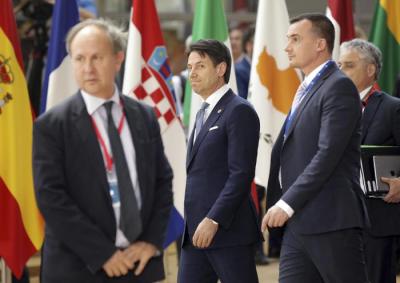Crunch migration talks, Conte warns EU of Italian veto

ROME – Italian Prime Minister Giuseppe Conte told Brussels on Thursday that he hoped he wouldn’t be forced to use a veto if the EU’s pivotal immigration summit failed to produce a favourable outcome for his country, political sources said.
“It's a possibility that I don't want to consider,” Conte said when questioned on possibility of Italy rejecting the European Council’s concluding statement.
German Chancellor Angela Merkel has called on unified, responsible work from European leaders in order to repair widening splinters and fractured relationships across the EU.
“We cannot leave the countries where most arrivals arrive alone. This is the central point of the Dublin III regulation,” Merkel said whilst Spanish Prime Minister Pedro Sanchez urged Italy should stop “incendiary talk” on migration.
“We are arriving at this summit with reasonable proposals in line with the European spirit and principles,” Conte stressed. “In recent years Italy has received expressions of solidarity in words. Enough. It’s now time for everyone to finally show solidarity with actions.”
“Today we will understand if Europe really wants to manage the migratory phenomenon together,” Conte said prior to the European Council.
The EU summit will seek to reach a consensus amongst all EU members for the shared responsibility of migrants who risk the perilous journey across the Mediterranean, spearheaded by Italy’s populist government.
If no collective agreement can be found, the fall-back option is for countries which vote in favour of shared responsibility plan to press on with the reforms to share the burden of migration. Those who reject the proposal, however, would be ejected from the free-circulation area, facing the closure of internal borders, in accordance with the Schengen code, Italian state-run news agency ANSA reported.
President of the European Council Donald Tusk emphasised the scale of the task facing the EU, which will be a defining moment in its history. “Stakes are high. Time is short,” was Tusk’s message as member States gear up for a challenging debate.
The sensitivity amongst EU States on how to manage migration flows has been ratcheted up in recent weeks, largely due to the hard-line anti-migrant approach of Italian Interior Minister Matteo Salvini.
German Interior Minister Horst Seehofer, whose rejection of secondary movements, most recently refusing to participate in the redistribution of migrants aboard the NGO rescue vessel Lifeline, poses a major threat both to the stability of the EU and Merkel’s wobbling government.
Meanwhile, Spanish NGO Proactiva Open Arms revealed Thursday that both Italy and Malta had rejected their ship’s request for docking access, where they had hoped to gather supplies and change crew members. The latest snub adds to the increasingly unwelcoming record of the two Mediterranean countries who have clashed in recent weeks over the acceptance of two separate migrant ships.
“Italy and Malta are denying access to their territorial waters for our ship Open Arms, which has saved more than 5,000 lives in a year under the coordination of the [Italian] Coast Guard,” the NGO said.
af


